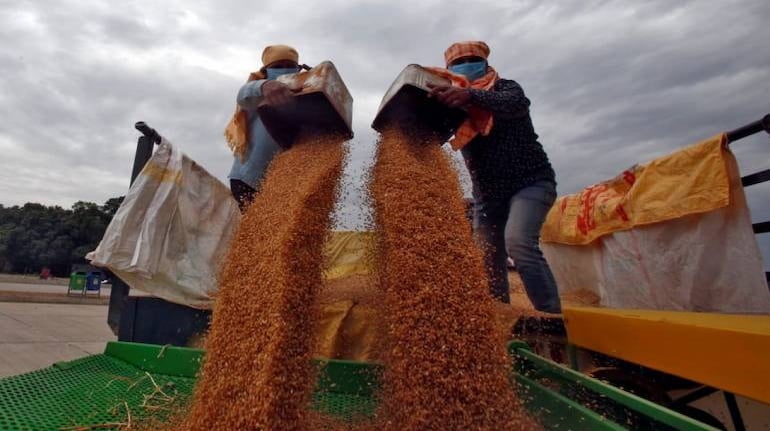
As wheat exports from India trickled to a stop, anxious importing nations have started putting in diplomatic requests as the list of countries seeking the grain continues to increase, officials told Moneycontrol.
About a dozen countries have reached out to the Ministry of External Affairs (MEA), seeking clarification on whether their requests for Indian wheat would be fulfilled, officials said. On the other hand, as many as 47 countries have sought food grains from India, with many others hinting they would also need them.
On May 13, the government banned all private wheat exports with immediate effect.
The decision came amid widespread loss of yield due to abnormal heat waves in the major wheat-growing states of Punjab, Haryana, Uttar Pradesh and Madhya Pradesh. Large parts of the crop had shrivelled due to the heat and, in certain cases, had become unfit for human consumption.
As a result, the official wheat production estimates for 2022-23 have now been scaled down to 105 million tonnes from 113.5 million tonnes estimated earlier.
However, the government kept open the option to export wheat as a tool of economic diplomacy. India will bilaterally permit export of the grain to other nations on their request in order to counter the spiralling global food crisis following the drop in wheat output.
“This has led to some confusion for other nations and created a scramble for securing Indian wheat as soon as possible. That is why there is a rush of nations calling to confirm if their requests would be made,” a senior official said.
The government estimates about 4.5 million metric tonnes of wheat have been contracted for exports in the current financial year. Of this, 1.46 million metric tonnes were exported in April alone. Reuters had reported that the sudden ban trapped 1.8 million metric tonnes of wheat at various ports across the country.
No export plan
The government is yet to come up with a process or formula to determine how much grain each country that seeks it gets from India, officials said.
“It is also not decided if the government will accommodate all the requests that have come in. As of now, the main focus is on meeting our global responsibilities and providing as many nations with required wheat as possible, if the domestic situation permits,” a food department official stressed.
In the absence of clear guidelines, many nations have decided to exert their influence and leverage their bilateral relationship with India to varying degrees in search of wheat.
Just a day before the ban, the commerce department had said the Centre would send trade delegations to at least nine wheat-importing nations to explore the possibilities of boosting wheat exports. On that list were Morocco, Tunisia, Indonesia, the Philippines, Thailand, Vietnam, Turkey, Algeria, and Lebanon.
There is no clarity on whether these trips will take place under the changed circumstances, officials said.
Meanwhile, other nations have begun to pressurise New Delhi to abandon plans for further tightening of the export ban. United States agriculture secretary Tom Vilsack criticised the move at the ongoing G7 meeting in Germany, calling it “an ill-advised decision” that will disrupt the market further and potentially increase prices.
US envoy to the United Nations, Linda Thomas-Greenfield said the US is asking other countries to avoid stopping wheat exports and hinted the issue will be discussed at upcoming multilateral meetings and other fora. Prime Minister Narendra Modi is expected to attend the G7 meeting in Germany next month.
Meanwhile, the European Union’s trade chief Valdis Dombrovskis called export-restrictive measures a tendency that can only actually aggravate the problem. Interestingly, China defended India's position, saying that blaming developing countries like India won’t solve the global food crisis.
Relaxed norms
The government has since relaxed the ban order. The Directorate General of Foreign Trade said wheat consignments already handed over to the customs authorities for examination and registered in their systems on or prior to May 13 can be exported.
This has benefitted only one major consignment, with the government allowing a full shipment of 61,500 MT of wheat headed to Egypt from Kandla port. The cargo was already being loaded at the port when the ban was announced and the company handling the shipment had informed the government that only 17,160 MT was left to be loaded.
Discover the latest Business News, Sensex, and Nifty updates. Obtain Personal Finance insights, tax queries, and expert opinions on Moneycontrol or download the Moneycontrol App to stay updated!